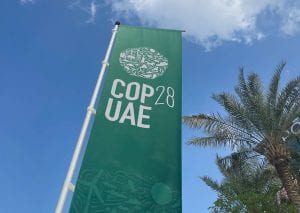by Dr Alice Venn, University of Bristol Law School
COP28 represented a crucial juncture for international climate law in permitting some initial conclusions to be drawn surrounding the efficacy of the innovative mixed regulatory approach adopted in the Paris Agreement. The legally binding nature of the Paris Agreement provisions have previously been the subject of debate in climate law and policy literature, both in terms of the language of the provisions, many of which are not worded to create clear and concrete obligations for the States Parties, and for the use of soft law to accommodate a more inclusive approach to global climate mitigation. We saw a marked shift away from the Kyoto Protocol model of legally binding targets for greenhouse gas emissions reductions applying only to Annex 1 developed States Parties and backed by an enforcement branch, to a soft law bottom-up system of Nationally Determined Contributions (NDCs) to emissions reductions which includes developing states and permits self-determined action in line with national capabilities. This system was crucially backed by the Paris Agreement Transparency Framework in Article 13, by the Implementation and Compliance Committee in Article 15, and by a system of 5-yearly global stocktakes from 2023 onwards in Article 14 to create accountability and measure progress in line with the overarching goals of the Agreement to keep global warming to well below 2°C above pre-industrial levels, with an ambition for 1.5°C.
The outcome of the first Global Stocktake has been eagerly anticipated and proved itself to be a particularly contentious point in the COP28 negotiations. The wording agreed upon has been celebrated for expressly calling on Parties to contribute to ‘accelerating efforts towards the phase-down of unabated coal power’, to ‘accelerating efforts globally towards net zero emission energy systems’, and to ‘transitioning away from fossil fuels in energy systems, in a just, orderly and equitable manner’[1]. The wording on transitioning away from fossil fuels represents an ambitious step forward from previous UN Framework Convention on Climate Change (UNFCCC) COP outcomes and there is an acknowledgement of the need for justice and equity in this process, which represents a key consideration to address the historical responsibility for the build-up of greenhouse gases in atmosphere borne by developed states, underpinned by the common but differentiated responsibilities and respective capabilities (CBDR-RC) principle in the international climate regime. Earlier drafts of the Global Stocktake outcome decision however included wording expressly referring to the ‘Phasing out of fossil fuels in line with best available science, the IPCC’s 1.5°C pathways, and the principles and provisions of the Paris Agreement’[2] which represented a much stronger commitment, both in terms of the wording on ‘phase out’, and the reference to the 1.5°C threshold which is particularly significant for the most climate-vulnerable developing states currently facing severe loss and damage resulting from climate impacts at 1.1°C of warming[3].
The reference to the implementation of the phase out in line with ‘the principles and provisions of the Paris Agreement’ was also potentially significant in terms of securing equity in the application of the CBDR-RC principle given effect in Article 2.2., Article 4.4, 4.5, and Article 14.1 of the Paris Agreement which notably provides that the global stocktake will take place ‘in the light of equity’[4]. The issue of equity in the implementation of the soft law NDC approach to global climate mitigation has come under scrutiny as a result of initiatives such as Paris Equity Check which assesses the fairness and ambition of the pledges made by States Parties based upon their historical and current contributions to global emissions, along with their wealth and capacity to implement mitigation measures and finds that many NDCs are falling short[5]. The preamble of the GST outcome decision recalls Article 2.2 of the Paris Agreement, reflecting ‘equity and the principle of common but differentiated responsibilities and respective capabilities’, along with Article 14.1 on conducting the global stocktake ‘in the light of equity’. Similarly, equity and CBDR-RC are reaffirmed in Paragraphs 6 and 7, while Paragraph 26 of the decision makes reference to equity in the context of differing time frames for the peaking of greenhouse gas emissions[6]. These references to equity and CBDR-RC are essential in ensuring a just response to the climate crisis which takes into account the unequal distribution of benefits and burdens between developed and developing states at the global level.
At first glance, the subtle shifts in the wording of the final GST outcome decision compared with the earlier drafts may not appear to be of any great significance, however they reflect the long-contested divisions between the negotiating positions of the developed, the rapidly-developing, and the developing states parties that are most vulnerable to climate impacts. The GST outcome decision represents a crucial stepping-stone for the scaling-up of climate mitigation action at the global level and there is a great deal of work still to be done to ensure an adequately ambitious and equitable response. It is perhaps too early at this first global stocktake juncture to draw overarching conclusions on the effectiveness of the mixed regulatory approach of the Paris Agreement, however in light of the urgent calls from the IPCC’s sixth assessment report, and the apparent continuing influence of fossil fuel industries upon States Parties’ negotiators, it is clear that the UNFCCC still has a significant hill to climb to secure its objectives to limit global warming to safe levels, both now and into the future.
[1] United Nations Framework Convention on Climate Change, Draft Decision -/CMA.5 ‘Outcome of the First Global Stocktake’ (13 December 2023), FCCC/PA/CMA/2023/L.17, at 3, Para 28.
[2] UNFCCC ‘Outcome of the First Global Stocktake’ Draft Decision (version dated 8 December 2023) Para 36.
[3] Intergovernmental Panel on Climate Change (IPCC) Sixth Assessment Report (2023) Climate Change 2023 Synthesis Report, Summary for Policymakers, available at: https://www.ipcc.ch/report/ar6/syr/downloads/report/IPCC_AR6_SYR_SPM.pdf (accessed 01/02/2024)
[4] Paris Agreement [2016] Article 14.1.
[5] Paris Equity Check, available at: https://paris-equity-check.org/warming-check.html (accessed 01/02/2024)
[6] GST outcome decision (2023) Paragraph 26.

